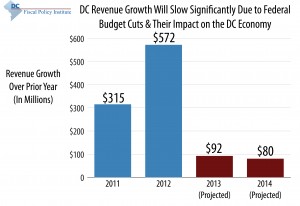DC’s Chief Financial Officer confirmed last week that the city’s revenue collections are increasing due to a growing population and expanding economy. The upward changes to the city’s revenue forecast will allow the Mayor and Council to support a supplemental budget for 2013, and will give the Mayor some opportunities to make new investments when he submits a budget for 2014 in March.
The bad news is that the new CFO forecast actually projects weak revenue growth for this year and next, especially compared with recent trends. While DC’s tax collections grew an average of 8.4 percent per year in 2011 and 2012, the new forecast suggests revenues will grow only 1.4 percent per year in 2013 and 2014. The main culprit: federal budget cuts from sequestration (or whatever may ultimately replace it) that will affect employment in the DC region and sap the main driver of our local economy.
The key figure reported last week is that projected revenues for 2013 are now $190 million higher than the last forecast for 2013. That sounds like ‘ and is ‘ a substantial increase. But it also is a bit misleading, because the last forecast was made a year ago, and the city’s economy has grown a lot since then. 
A clearer picture of the state of DC’s finances comes from looking at actual revenue collections in the last two years and projections for this year and next. By that, the District’s finances are not looking strong at all. DC’s tax collections soared in 2011 and 2012 ‘ rising $315 million in one year and $572 million in the second. But last week’s forecast projects that revenues will rise just $92 million in 2013 followed by another $80 million in 2014.
The CFO’s forecast seems to assume the impact of federal budget cuts will be swift and severe ‘ largely as a result of furloughs of federal government employees and cuts in federal contracting starting in March. Consider this: DC’s sales tax collections in the first four months of Fiscal Year 2013 are running 18 percent higher than the same period last year, and income tax collections are 22 percent higher, a reflection of a growing population and rising incomes. Yet the new revenue projection suggests that both sales tax and income tax collections will be lower for the last eight months of the year than in the same period in 2012. In other words, the federal cuts will almost immediately slam the brakes on our fast-moving economy.
There are some other signs of softening in DC’s economy, too. While the number of working DC residents is growing, the number of jobs in the city (held by residents and non-residents) is not. And the amount of office space in use in the city fell slightly last year. Both of those seem to reflect early signs of a shrinking federal government.
The CFO’s revenue projection finds that DC’s economy and finances are strong ‘ but very vulnerable. Even with federal budget cuts, the city’s tax collections are growing and creating some opportunities for new initiatives. But economic and revenue growth will be hampered greatly by federal budget cuts. DC, like the rest of the region and nation, will be in much better shape if the President and Congress work to create a more thoughtful plan to address the federal budget.
To print a copy of today’s blog, click here.
